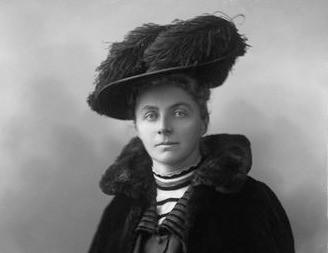
Emily Hobhouse is remembered today for her revelations of conditions in the concentration camps of the South African War, but her later humanitarian and pacifist activities are much less well-known. Now a team of UK and South African researchers are piecing together her life in South Africa and her work in Europe during and after the First World War. Their research will focus on Hobhouse's letters to her wide circle of supporters and her practical contribution to projects for international peace, relief and reconstruction.
The project team - Drs. Helen Dampier, Rebecca Gill and Kate Law - are keen to make contact with those who can help them recover relevant objects and letters from the time. They are particularly interested in Hobhouse’s involvement in establishing the Boer ‘Home Industries’ following the South African War, and especially the Spinning and Weaving schools initially established at Philippolis in 1905. Hobhouse’s reports to her supporters record her efforts in helping train girls in the crafts of lace making, and weaving fabric for the making of blankets, rugs and other domestic textiles to replace those lost during the war. The aim was also to make peace between Boer and Briton in South Africa through co-operative ventures in supplying the schools and selling their merchandise, and the finished goods were displayed and sold in both South Africa and the UK. Hobhouse was helped by, amongst others, Maynie Fleck and Johanna Rood, and by British Quakers – including Margaret Clark, Ruth A. Fry and Marion Rowntree – who journeyed to South Africa to help in the running of the school. Photographs show the students working on spinning wheels donated by Swiss supporters and looms constructed specially for the scheme. Eventually these schools were taken over by the authorities in South Africa and some remained operational until the 1940s. The project team are eager to hear from individuals, or organisations such as schools or local museums, who may have textiles or fabrics produced in Hobhouse's Spinning and Weaving schools in their possession. Their intention is to document the history of these objects by photographing them, and collecting stories from their current owners about their origins, and how they have been preserved, used, or handed down.
The Emily Hobhouse Letters: South Africa in International Context, 1899-1926 project is funded by the UK’s Arts and Humanities Research Council and will result in an exhibition of Emily Hobhouse’s life and work at the War Museum in Bloemfontein and Smuts House in Pretoria. If you are interested in finding out more about the project, or are the owner of an example of the Spinning and Weaving school textiles and would like to contact the project team, please email emilyhobhouseproject@gmail.com or tweet @emilyhobhouse
Disclaimer: Any views expressed by individuals and organisations are their own and do not in any way represent the views of The Heritage Portal.
